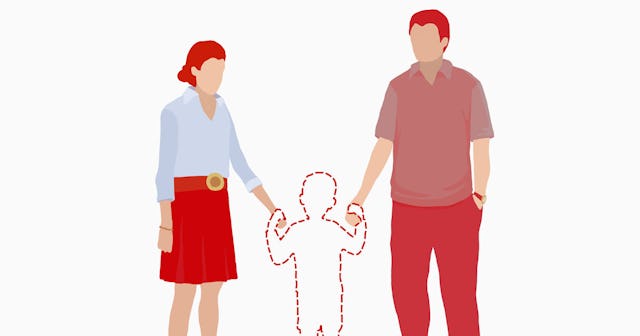Estranged From Your Parents? You're Not Alone

I don’t speak to my parents. There’s a word for that: estranged. According to Oxford Dictionary, it comes from the Latin “extraneous,” or “not belonging to a family”; that became “extraneare,” meaning “to treat as a stranger,” then traveled through French as “estranger,” finally settling as “estranged” in English: “no longer close or affectionate to someone; alienated.” I prefer the last: alienated. It captures estrangement’s tangled pain, its utter strangeness. How is your mother? I don’t know.
Estrangement is seldom simple, seldom an easy slice. It’s a jagged, ugly amputation, slow to heal. And it’s seldom one-sided. Estrangement is complicated. Tolstoy says that, “Happy families are all alike; every unhappy family is unhappy in its own way,” and so too with estrangements. They can be a slow choice, made over years, or a quick one; they can result from harsh abuse or toxic behavior. They can double and redouble, coming back and leaving.
We’re not supposed to talk about it. Who, after all, cuts off their parents?
I look at my children and think: what could they do to make me cut them off? I rack my brain. Kill my spouse? Kill their brother? All scenarios involve murder or unimaginable abuse of another family member. My mother’s reasons for ignoring us become laughable in comparison. Our reasons are less laughable, but no less diminished when held against that yardstick.
Estrangement Hurts
I know you. We’ve never met, but I see you. You hurt. Our pain may lessen, but pieces will always be missing. I say it like this: I do not miss a particular person. That person hurt me for a long time, over and over. Instead, I mourn that missing role in my life. Certain days hurt. A missing person doesn’t make them hurt. A missing role hurts instead.
Your family was not healthy. You had to leave some of it behind to save yourself. You didn’t make that choice lightly, and you still feel guilty about it sometimes. You question yourself: did I make the right choice? Maybe I should have given them another chance. But so many chances were given. So many olive branches were extended. You took it and took it and took it some more until you finally broke. Be honest with yourself.
Tell yourself your story from another person’s point of view. Start at the very beginning, and listen as you tell it. See yourself from the outside. When you finish that story, you’ll realize that you made the best choice. You’ll also realize that you probably should have made it sooner.
Children of Estranged Parents Are Judged
fizkes/Getty
Why don’t you speak to your parents? Estrangement seems to demand explanation. After all, parents and children share the oldest, most primal bond; severing it is so taboo the Abrahamic god demanded Moses carve it in stone: Honor thy father and mother. When people discover our estrangement from a parent(s), they ask questions. Behind it, lurking: what could your parents possibly have done?
You do not owe anyone an explanation. You can say: It’s not a discussion I like to have. Or, It’s painful to talk about. Or, That’s an unpleasant subject. Let’s not dwell on it. You do not owe even your closest friends details, blow-by-blow justifications, he-said-she-saids, or detritus from your childhood. You can simply say, “My mother/father and I don’t speak.”
You’ll have to live with the judgment.
In general, barring prosecuted abuse, people with normal parents will not understand you. My husband simply could not comprehend my mother’s behavior and my response. It baffled him. Parents refusing to speak to their children, and children refusing to speak to their parents, seemed impossible, cruel and strange: his family was too healthy. They wouldn’t cut one another off.
Estrangement May Have Cost You More Than Your Parents
My estrangement came with an enormous cost. Every cousin, every family friend I called aunt: gone. You may have lost other friends and relatives when sides were taken, when lines were drawn. Arguments and accusations fractured outward even as you tried to contain them. Your parent demanded sympathy, and they got it — at your expense. You are the scapegoat. You are the ungrateful child. You are unloving and cold.
This can be as painful as your estrangement. Perhaps you’ve not lost one person. Perhaps you’ve lost many. If you’re like me, you haven’t bothered to defend yourself. It’s too much effort have a surrogate shouting match. I have accepted: they have been told certain things about me, and they are not true, and I need to live with this. Mostly I try not to think about it.
But What About The Kids?
We haven’t really told our children. They know we haven’t seen my mother. They miss her. How do we say: We told her she should talk to you, and she hasn’t. We begged her to talk to you. We never restricted her access to you and she ignored you anyway. We can’t say those things. Words become unimaginable. My mother doesn’t love me enough is sayable. Your grandmother doesn’t love you enough is not.
Like me, you’ve probably struggled with this. Maybe you’ve found a solution. When the time comes, we’ll be honest. That time is not now. Now we sidestep, dodge, and distract. If you’re there too, so many of us get it. We don’t judge you for it.
But when we hold hurt as enormous as estrangement, words eventually fail. We falter, stumbling as we try to understand what we can’t fix. But we come, in the end, to one bare thing: you’re not alone.
You did not deserve this. You deserve love and happiness. And despite the ones who judge, there are plenty of people who understand, and validate, your pain.
This article was originally published on